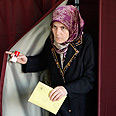
Erdogan's party leads in first count
Election Day: Turkey's ruling party leads with 53% of votes after half counted, proving predictions that it would win third term. Erdogan vows to draft new constitution with 'basic rights and freedoms'
Turkey's ruling party sought a third term in elections Sunday, aiming to build on economic and diplomatic advances in recent years as well as introduce a new constitution it says will make the country more democratic.
The Justice and Development Party of Prime Minister Recep Tayyip Erdogan was leading in early returns from Sunday's elections. With 50% of votes counted, state-run television TRT said, the party has so far won 52.8% of votes, placing them at a predicted 331 parliament seats.
Reports say the Republican People's Party, the main opposition group, has 20% of the vote.
Some 15 parties and 200 independent candidates were contesting 550 seats for four-year terms in parliament, with surveys in past weeks also indicating the Justice and Development Party was headed for another win.
- Receive Ynetnews updates directly to your desktop
About 50 million Turks, or two-thirds of the population, were eligible to vote. Polls were scheduled to close at 4 pm Sunday in the country's eastern provinces and 5 pm in the west. Reporting results is barred until 9 pm, although preliminary returns have emerged earlier in the evening in past elections.
For the first time, voters cast ballots in transparent plastic boxes in which the yellow envelopes could be seen piling up. The measure was designed to prevent any allegations of fraud. In past elections, wooden boxes were used.
"We have spoken, and now it is time for the people to speak," Erdogan said in Istanbul. "For us, this will be the most honorable decision and one that we will have to respect. As far as I know, the election process is continuing through the country without any problems."
A group of supporters greeted his arrival at a polling station by shouting: "Turkey is proud of you."
Turkey, a NATO ally with a mostly Muslim population, stands out in a region buffeted by popular uprisings as a rising power with traditional Western alliances as well as growing ties in the east and elsewhere. In the past decade, the government has sharply reduced the political clout of the military, but it has yet to resolve a conflict with minority Kurds who have long complained of discrimination.
Despite its successes, Turkey's government faces opposition accusations that it seeks to consolidate power at the expense of consensus-building. Much of the debate among commentators has centered on whether the ruling party can secure a two-thirds majority in parliament that would enable it to push through a new constitution without the support of other political groups.

Prime minister votes in Sunday's elections (Photo: Reuters)
Few details on new constitution
Erdogan has promised that a new constitution would include "basic rights and freedoms," replacing a constitution implemented under the tutelage of the military in 1982. However, he has provided relatively few details on a possible new draft.
The government has Islamic roots, long a source of suspicion among secular circles that once dominated Turkey and fear that Erdogan seeks to impose religion on society.
Turkey's leaders, however, describe themselves as moderates and "conservative democrats" who are committed to the ideals of Western-style democracy. After winning election in 2002, they implemented economic reforms that pulled the country out of crisis. The growth rate last year was nearly 9%, the second highest among G-20 nations after China.
Still, political reforms faltered in the ruling party's second term. Turkey's bid to join the European Union has stalled, partly because of opposition in key EU nations such as Germany and France. Critics point to concerns about press freedom and the Turkish government's plans for Internet filters as signs of intolerance toward views that don't conform to those of Turkey's leadership.
For all of Turkey's challenges, Sunday's vote was an indicator of stability in a country that suffered fractious coalition politics and military coups in past decades. Voting was largely peaceful and orderly, with large crowds gathering early to cast ballots.
"We have come to the end of a long marathon," Kemal Kilicdaroglu, head of the opposition Republican People's Party, said after arriving at a polling station with his wife and son. "Today is the time for a decision by the people. We will respect their decision. There is a good mood. There is a democracy feast."
- Follow Ynetnews on Facebook










